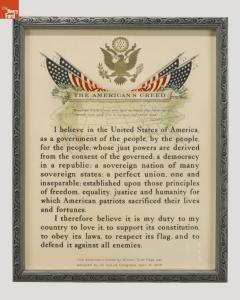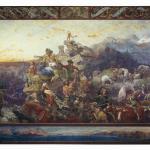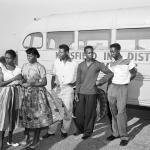by Janine Giordano Drake
A few weeks ago, as my ELCA Lutheran church was reciting the Apostles Creed–like we always do– on a cloudy Sunday morning, the woman next to me in the pew loudly offered a protest. Instead of professing faith in the “Holy Spirit, the holy catholic church, the communion of saints, and the forgiveness of sins” like it was written in the church bulletin, she changed “catholic” to “Christian.” We were in an unmistakably Lutheran Church, but she apparently felt uncomfortable using the term “catholic” as a synonym for “universal.” Or maybe she did not even believe in a universal Church. Maybe she meant to revise the creed to suggest that she believes in Christianity but nothing universal at all.
It’s funny to me how much Americans find the prospect of a universal church, a core tenet of our faith embedded in the Apostles Creed, something worthy of critique. I once had an interview at a Christian college which began (and nearly ended) with the question, “How do you feel about Emperor Constantine’s impact on Christianity?” The question arose as if there is a clear right answer, and as if this right answer is a litmus test for determining the quality and strength of one’s faith. Honestly, I think the answer is rather complicated. Constantine created universals that allowed cultural transmission across great geographic space. Imperial-endorsements-of-religious-traditions also trample on local culture, local language, and local identity. This is a form of cultural violence. But, presumably, the hope of a universal church is that what is gained is more than what is lost. That is not the answer that committee was looking for. American Christianity, and particularly American evangelicalism, is steeped in republicanism, the popular nineteenth rebellion against monarchy that I would argue is still very much with us. Early nineteenth century patricians built the American republic project around the idea that a virtuous citizenry, exercising virtuous personal judgments, could make this land into a beacon of democracy. It is not surprising that the Apostles Creed has only barely survived the rise of evangelicalism in the United States. This is a land of independent Christians who don’t really think they have much need of a church, much less a universal creed or a universal church. I should not be surprised that a twenty-first century American who finds herself in a Protestant liturgical church on a Sunday morning took the profession of faith as an opportunity to clarify her terms.
And yet, and yet, the history of American Protestantism is the history of “independent churches” and communities (sometimes in denominational units, sometimes in ethnic or other units) trying–and failing–to build unity with one another. Our faith compels us, and then our republicanism holds us back. Our faith compels us, and then our mad commitment to personal virtue leads us to proclaim that our theology is superior to that of our neighbor’s and thus unity would leave us “unequally yoked.” Our faith compels us, but our profoundly nineteenth century American identity tells us that we have no need of unity with anyone other than God.
In my grad seminar this week, I will raise what I see as a big question necessary to understand the 1920s: What is gained, and lost, in the Fordist Americanization movement? In the first few decades of the twentieth century, Henry Ford pioneered a giant experiment which one scholar called “Assembly Line Americanization.” He sponsored English schools for immigrant and African American workers wherein his staff not only taught workers how to think, act, and behave “as Americans” (ahem, Anglo-Protestants), but which rewarded these workers monetarily for doing so. At the end of the class, students (assembly line workers) were invited to participate in a ritual wherein they would enter into a set of a “ship” with their native clothing and customs and come out with “American clothes,” eating American foods, speaking English, and draped in an American flag. Ford, the historian Steve Meyer reminds us, had the support of all the area ministers in this Americanization project.

Before we jump in to remind ourselves that Ford was a capitalist, and this universalization-of-American-workers was the dream of American capitalists (and their fascist friends), we then read a few chapters from Liz Cohen’s Making a New Deal which tells the story of how the many Jewish communities and Roman Catholic Churches were engaged in very similar projects of unifying (and maybe even standardizing) the concept of a Jew or a Catholic. Cohen might have added that the Federal Council of Churches, and the Moody Bible Institute, were also on their way to accomplishing the same goal (even if they competed with one another in that pursuit). As Tim Gloege taught us in Guaranteed Pure, the craze for building a national brand that transcended ethnic identities and denominational affiliations was very big in the 1910s and 1920s. This is, of course, how we got the appeal of fascism in the US and around the world. But is it all bad? Did it have its benefits? Cohen’s book offers that it was not until these many ethnic stakeholders are united into larger units, not until these many atomized working class communities come to see themselves as part of something bigger, that working people in the US are able to build the solidarity necessary for creating the New Deal.
Personally, I go back and forth. I always root for the many ethnic communities of the 1910s–the Italian orders of sisters who hold out from submitting to Archbishop Mundelein in Chicago, the Polish national churches who get to maintain their independence from the Irish Catholic hierarchy into the 1920s and despite the wishes of the archbishop, the many local ethnic banks and mutual aid societies which serve the dual purposes of supporting the future of that ethnic group while also giving those people the opportunity to thrive in the United States. I think that historians do not do enough to acknowledge that the universality of the Roman Catholic Church in the United States did not come without a tremendous fight with the many national churches, and did not come without a lot of resentment and anger and loss. In many respects, the Irish Catholics at the head of the hierarchy enforced the terms of Americanization because they wanted to earn the respect of white Protestants like Ford. I think Ford’s vision of Americanization was a form of cultural violence, a pageant of racial and ethnic submission that I wish workers didn’t have to stomach to get that “profit sharing” envelope at the end of the week.
And yet, another part of me wonders if I am, like many Americans, a little too hung up on the primacy of personal virtue as a way to identify and qualify a Christian. We have a pretty good track record in this country at fighting fascism, and I am not suggesting that we give up that fight. And yet, we also ought not let our fears of fascism lead us to throw out our calling to see ourselves as part of a universal church.













